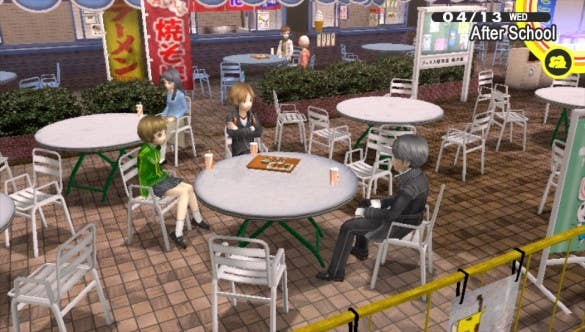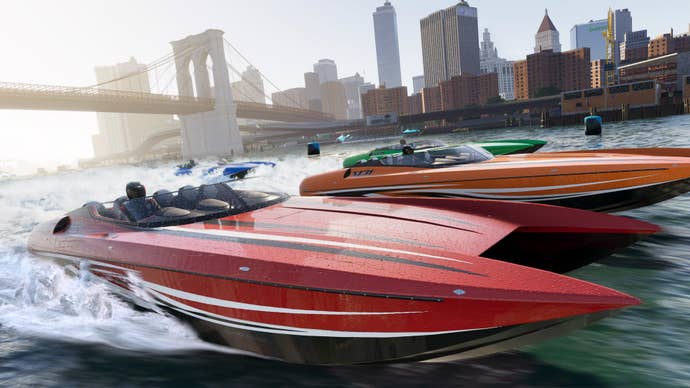The Vita Deserves to be Remembered as More Than a Failure
STARTING SCREEN | An ode to Sony's handheld, this week's releases, and more.
This article first appeared on USgamer, a partner publication of VG247. Some content, such as this article, has been migrated to VG247 for posterity after USgamer's closure - but it has not been edited or further vetted by the VG247 team.
It was a few days before E3 that I dug out my Vita for the first time in close to a year. I don't remember the impetus for doing so, only that I wanted to keep plugging through Super Robot Wars V. A few days later I tucked it in my travel bag, leaving my newer and shinier Switch at home.
Playing my Vita has left me thinking about the discourse around it and its overall history. The mainstream games media has not been kind to the Vita over the years, often replying with a snarky "Vita means life" when it comes up. We're more predisposed toward liking the Vita than most around these parts, but even we've been harsh on it at times, often focusing on its faults rather than its strengths.
To be sure the Vita has deserved criticism over the years. The decision to go with proprietary memory was a disaster, and official support ended up being meager at best. Sony's biggest push was to make it cheaper to manufacture by going with a worse screen. As a high-end portable gaming machine, it struggled from the start, and it never got the sort of push that the 3DS enjoyed in its first year.
Nevertheless the Vita managed to differentiate itself from the 3DS and its predecessor, the PSP, in a number of interesting ways. Unlike the 3DS, it enjoyed substantially more connectivity with traditional consoles, most notably through remote play. It had a much better screen. And while you couldn't connect it directly to a TV, it was quite easy to transfer saved data back and forth between supported games.
The launch unit itself was gorgeous. Portable games shined on the Vita's bright and clear OLED touchscreen, and it had a heft to it that the PSP lacked. It wasn't quite as powerful as the PS3, much less the PS4, but it was close enough that many games ended up getting simultaneous releases in the Vita's years.
The Vita's lifespan was ultimately divided into three overlapping but mostly distinct stages. The first stage saw it positioned as a true portable console featuring high-end games like Gravity Rush, Assassin's Creed, Persona 4 Golden, and even Borderlands 2. This was when Sony still wanted the Vita to be the true realization of the PSP's original potential. This stage petered out almost immediately.
The second stage saw Vita repositioned as a portable Steam machine of sorts, with indies like Spelunky, Guacamelee, Shovel Knight and Rogue Legacy all making their way to the device. Often they came out well after the original, but it was still novel to be able to play these bite-sized experiences on the go, and they played a crucial role in filling out the Vita's otherwise barren library.
With the general decline of indies on Sony's platforms, the Vita finally settled into its final form: full-blown Japanese gaming machine. The last couple years have seen the Vita play host to cult favorites like Danganronpa V3 and Trails of Cold Steel; anime adaptations like Digimon and Super Robot Wars, and many, many visual novels. It hasn't come close to matching the success of the PSP in Japan, mostly owing to the explosion of mobile gaming and the lack of Monster Hunter, but it has nevertheless managed to get some traction in its home country.

These three stages have left the Vita with a surprisingly well-rounded library of console ports and indies, as well as retro PlayStation and PSP releases (the Vita is currently the best place to play Final Fantasy IV and Persona 3). It's a console rich with classic gaming, especially for RPG fans, and a solid indie machine to boot. And it's about the only good way to play one of the single best JRPGs of the past 15 years.
Its biggest failure, arguably, is its lack of a truly definining game. It doesn't have a Pokemon or even a Crisis Core to its name—many of its best games are ports. Even now, most new Vita games get a simultaneous release on the PS4. It's less a full-blooded portable console than an accessory for machines that you likely already own.
Still, I can't help loving my PlayStation Vita. It's been the perfect companion to my 3DS over the years, offering portable experiences I couldn't find anywhere else until the advent of the Switch. It made it possible to play PS4 on the couch when the TV was occupied. It was the system through which I truly came to appreciate the Shin Megami Tensei series.
Super Robot Wars V is likely my last ride with the PlayStation Vita. When I'm finished, it will go back in one of my drawers alongside my 3DS, its role usurped by the Switch. I doubt anyone will ever see it as a great handheld console, but I will remember the good times I had with the Vita. And who knows, I may yet pull it out again. After all, even now there are still new games coming out for it, and many more still to be discovered.

Looking Ahead to the Rest of the Week
- Nier: Automata (Xbox One) [June 26]: One of our favorite action RPGs of 2017 is finally making it ways to the Xbox with Xbox One X enhancements. Yes, it's still worth playing if you missed it the first time.
- Lumines Remastered (PC, Switch, PS4, Xbox One) [June 26]: The PSP rhythm gaming classic returns, and it's bringing trance vibration with it. Neat! Lumines seems like an especially great fit for the Nintendo Switch, but it's great no matter where you play it. Bring a nice pair of headphones.
- The Awesome Adventures of Captain Spirit (PC, PS4, Xbox One) [June 26]: Dontnod's free-to-play spinoff is mostly of interest due to its connection to Life is Strange. Will we get a hint of what's in store for Life is Strange 2? Internet detectives will surely find out.
- Ys VIII (Switch) [June 26]: Ys VIII is portable now, but a reduced framerate and localization troubles may make it more enjoyable on PS4. Still a fantastic action RPG no matter where you play it.
- The Crew 2 (PC, PS4, Xbox One) [June 29]: The Crew 2 had a rough closed beta, bringing with it poor word-of-mouth and reports of reduced graphical fidelity. We'll see how the final version fares in our review on Friday. I'm still just mad that it once again erases my home state from history.
- Wolfenstein 2 (Switch) [June 29]: Another one of our favorite games of 2017 makes its way to Switch this week courtesy of Panic Button. Make sure to buy an extra memory card, though.
This Week's News and Notes
- In case you missed it, we recently kicked off a new project that traces the history of RPGs through specific games. Our goal? To get a handle on what exactly makes the genre tick. You can read the first entry here.
- Great artists steal? Fortnite rode the wave to popularity by looking at PlayerUnknown's Battlegrounds (PUBG) and taking the Battle Royale mechanics wholesale. So one good turn deserves another. PUBG has received the Event Pass, which is a new system not unlike the Battle Pass in Fortnite Battle Royale: pay $10 and play the game to unlock additional cosmetic items.
- The company currently known as Atari is still working on its upcoming Atari VCS retro-console. Many have noted that the company has promised more about the console than it's actually delivered so far, including one reporter at The Register. When Atari called out that reporter's negative impression and interview, The Register responded by posting the audio of that interview. It doesn't reflect well on Atari at all.
- On the theme of underappreciated consoles, I unpacked my Wii U to play some Smash Bros with guests over the weekend. I can't say I was expecting to hook it up so soon.
- In the legal space, Bethesda has filed a lawsuit against Warner Bros Interactive Entertainment over Westworld Mobile. Bethesda alleges that Westworld is simply a blatant copy of Fallout Shelter. In the suit says Westworld co-developer Behaviour Interactive actually stole source code from Fallout Shelter. We'll see how everything shakes out.
- One of the things that set Fortnite Battle Royale apart is its unique endgame, where opposing players build huge towers and forts, trying to gain the high ground. Well Epic Games is looking to change that, to provide a bit more variety when it comes to endgame play. Some fans are unhappy about the potential change, but Epic has yet to offer any details.
- There's been a lot of clowning in Microsoft's direction, considering Sony and Nintendo are making moves when it comes to first- and third-party support. At least for May though, Microsoft took the crown. State of Decay 2 was the best-selling game in May, even though it's available on the Xbox Game Pass program. It beat out Sony exclusives God of War and Detroit: Become Human, even though the latter released in the same month. Nintendo re-releases Donkey Kong Country: Tropical Freeze and Hyrule Warriors Definitive Edition took the fifth and seventh spots on the chart, while evergreen titles like Grand Theft Auto V, Rainbow Six Siege, and Mario Kart 8 filled out the rest of the chart.
- In case you missed it, I was recently on Kinda Funny Games Daily to talk about the Bethesda lawsuit, the cross-play controversy, and a whole bunch of other topics. Thanks to Greg Miller for having me on!
- Axe of the Blood God: Kat and Nadia have kicked off our Top 25 RPG game countdown! What do the heralds of the Blood God see as the best of the best in the genre? The series starts right here!

